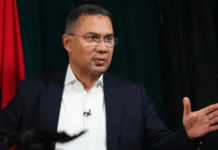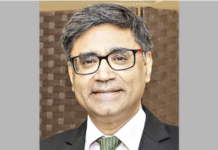Dhaka Tribune 5 May 2022
It was a rude surprise for people of Bangladesh when Foreign Minister Momen made it known that Bangladesh would be seeking Indian support in trying to convince US to lift sanctions imposed on RAB

File photo: Bangladesh Foreign Minister AK Abdul Momen speaks during a meeting with US Secretary of State Antony Blinken at the State Department, in Washington, DC, US on April 4, 2022 Reuters
May 5, 2022 4:18 AM
Diplomacy is never a matter of being contracted out to a third country when the issue in question is bilateral in form and substance. And foreign policy is an area where governments devise their own modalities of dealing with their neighbours and with nations beyond. Therefore, it was a rude surprise for the people of Bangladesh, for everyone across the spectrum, when last week Foreign Minister AK Abdul Momen made it known that Bangladesh would be seeking Indian support in trying to convince the US authorities to lift the sanctions Washington recently imposed on serving and former officials of the Rapid Action Battalion. The sanctions, one might recall, were imposed in light of the US authorities’ understanding that RAB has had a role in human rights violations in Bangladesh.
That said, one cannot but make the point that this is the very first time that a foreign minister of Bangladesh, or for that matter any individual holding a position of influence in the government — now or in the past — has in so many words informed us that our diplomacy is not working, that we now need to hand it over in contract to a state that might do for us what we on our own have failed to do. Dr Momen’s statement, one can be quite sure, will have left the Indian authorities embarrassed as well. We are not quite sure if the Bangladesh foreign minister raised the subject with Indian Foreign Minister S Jaishankar when the latter was in town recently. One hopes our foreign minister did not pursue the subject any further.
The foreign minister’s statement has patently undermined our own foreign policy establishment in Shegun Bagicha and indeed the government. For one thing, it has given out the feeling (misplaced, as far as Bangladesh’s people are concerned) that we need not worry about a resolution of our overseas problems because we have a neighbour who might or will do that job for us. For another, the ministerial statement is a poor reflection on the state of Bangladesh’s foreign policy, especially at a time when we as a nation have happily been celebrating a half century of our existence as a sovereign nation-state. Plainly, if we as a people require third-country assistance in handling issues we have with governments abroad, where are our foreign policy perspectives here? Have we not built a diplomatic policy structure reliable enough to deal with the world on our terms and in line with our aspirations?
We have problems with India over a sharing of the Teesta waters. We certainly will not ask that a third country lobby for us with Delhi’s South Block on the issue. There are yet the old issues relating to a division of assets and liabilities of pre-1971 Pakistan. We surely do not think any Middle Eastern government should be asked to intercede with Islamabad on our behalf? We would like two of Bangabandhu’s assassins — in Canada and the United States — to be extradited to Dhaka for them to face justice. We do not imagine it will be wise or a mark of modern diplomacy to solicit the assistance of the United Nations or a European government to press our case in Ottawa and Washington.
The bottomline ought to be obvious: governments and nations serve themselves best, indeed uphold their self-esteem, when they formulate and implement foreign policies which underscore their ability to speak for themselves in the councils of the world. Diplomacy, let us repeat, cannot be leased out to governments abroad. Since 1972, Bangladesh’s foreign policy has been an assertive affair. Every government since that period in national history, including the present one, has constantly affirmed the foreign policy objectives of the Bangladesh state. We did not lobby other governments to speak for us when we sought to enter the United Nations, the Commonwealth, the Non-Aligned Movement, the Organisation of Islamic Cooperation and other bodies regional and global. We did our own work. Why must we falter today?
The requirement on Bangladesh’s part is clear and without ambiguity. The nation’s diplomacy is in grave need of purposeful restructuring. Our diplomatic missions abroad need to be energized into being articulate and meaningful representatives of our nation abroad. Our foreign policy must be an assertive, principled statement of objectives where handling the Myanmar regime on the Rohingya question is concerned, where regional cooperation vis-à-vis Saarc is the issue, where dealing with disputes with Delhi and Islamabad is a focal point, where bringing back the 1975 assassins is of critical importance. On the issue of the sanctions on RAB, let our Foreign Office, through our diplomats in Washington, and the US State Department engage in constructive dialogue.
This country is in serious need of a foreign policy that is dynamic and in tune with the requirements of 21st century post-modern diplomacy. That will be possible only when we recruit and send out to global capitals the best and the brightest in our diplomatic structure. And, of course, all of that is dependent on the presence of good, informed and enlightened leadership at the top of the nation’s foreign policy edifice.









